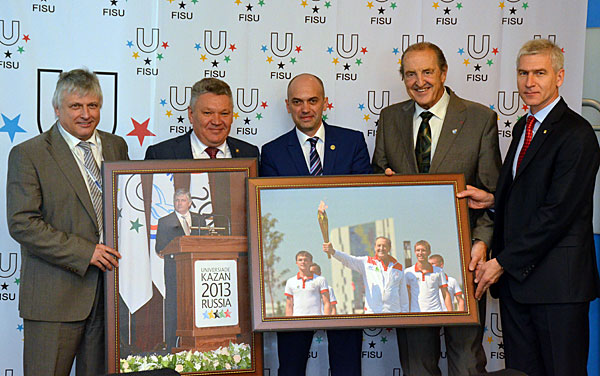BRUSSELS – Today, 24 May, the FISU Executive Committee meeting held its second day of meetings. On the agenda were the final reports of the Universiades that concluded in 2013 and the progress reports for the upcoming Games.
2013 Summer Universiade
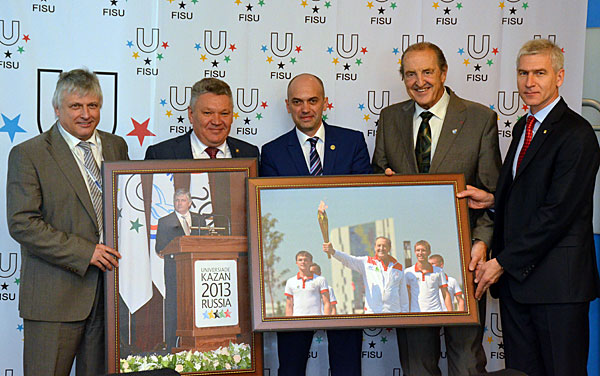 Eric Saintrond, Rafis Burganov (Minister of Sport from Tatarstan), Azad Kadirov (Deputy Secretary of the Kazan OC), Claude Gallien and Oleg Matytsin
Eric Saintrond, Rafis Burganov (Minister of Sport from Tatarstan), Azad Kadirov (Deputy Secretary of the Kazan OC), Claude Gallien and Oleg Matytsin
Azat Kadyrov, Executive Director of the Executive Directorate of Kazan 2013 and Rafis Burganov, Minister of Youth Affairs and Sport of the Republic Tatarstan presented the final report.
‘The Universiade in Kazan became a vivid and memorable sporting event in a series of major competitions held in our country in the last 30 years. It has presented modern Russia as a great sports nation in the best light possible’, the Minister said. ‘I am certain that visitors and participants will remember the Kazan Summer Universiade as one of the best of many years to come. The memories of the Games will long live in the hearts of the residents of our Republic and city. The Universiade did not just transform our city, but also changed the way our people think, their attitude towards sports and a healthy lifestyle.’
Azat Kazyrov reminded the EC members of the key facts of the Games. For the city, these Games were not an end but a new start. ‘Our current goal is to provide for a rational and effective use of the rich legacy that was left after the Universiade. To that end, we have developed the 27th Summer Universiade Legacy Concept, which compromises the following main components: modern cost-effective sports venues, material and technical foundation for universities, unique Universiade Village complex and a modernised city infrastructure.’ No doubt, the Universiade was a strong incentive that pushed forward the socio-economic development of Tatarstan and Kazan in particular. ‘As we originaly planned, the city underwent 15-20 years of development in just 4 years’, Kazyrov explained and gave as an example the Kazan International Airport which was renovated and received the award of ‘Best Regional Airport in Russia and the CIS’, while the city was also been named city with the best transport system out of the 9 Megapolises in Russia. It is now almost five times easier to move around Kazan than in Moscow. This large divide between Kazan and other Russian cities is also a shining example of the Universiade legacy. Kazan continues to be a ‘sports city’. Recently, the European Badminton Championships were held at the Gymnastics Centre, while the Aquatics Palace hosted the National Synchronised Swimming Championships. The World Fencing Championships will be held in July. In 2015 the FINA World Championships will be hosted and in 2016 the IAAF World Junior Championships. Furthermore, in 2017 and 2018 the city will welcome games of the FIFA Confederations Cup and FIFA World Cup respectively. ‘The legacy of the FISU Universiade in Kazan will serve Russia and the Republic of Tatarstan for many long years’, Kazyrov ended his report. ‘We are not saying goodbye, we are merely saying see you soon!’
2013 Winter Universiade
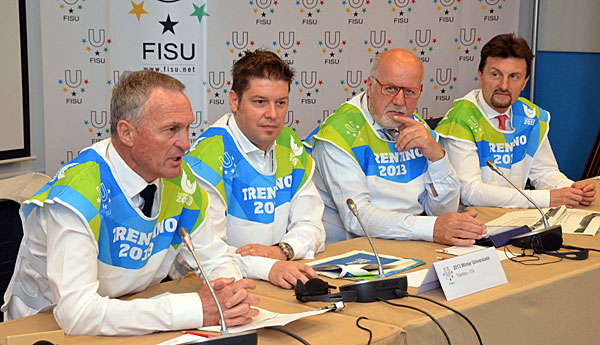 The Trentino 2013 OC delegates with from left to right: Ubaldo Prucker, Filippo Bazzanella, Sergio Anesi and Paolo Bouquet.
The Trentino 2013 OC delegates with from left to right: Ubaldo Prucker, Filippo Bazzanella, Sergio Anesi and Paolo Bouquet.
The CSU WU then gave its final report which was followed by the final report of the Trentino Winter Universiade.
‘The Winter Universiade gave Italy and Trentino the opportunity to show-case a premium alpine region which provides a high standard of living, of education, modern mobility infrastructure, IT technology, well-being and sports culture. All of this makes for a harmonious blend between nature, tradition and innovation’, Sergio Anessi, President of the OC said. However, the games in Trentino were a challenge. The OC had to work within a limited time and a restricted budget. Nevertheless, the OC successfully managed to provide a first-rate organization and made the most of contributions from their youth and the resources of the Organizing Committee members. The limited budget available was compensated thanks to the provision of many services by the Founding Partners.
‘The Universiade has generated an economic turn-over for the territory, estimated in 15 mln Euro’, Filippo Bazzanella, Secretary-General from the OC explained. ‘This Universiade is the first big sport Event in Italy which measured its impact through a social budget, to provide to the stakeholders an overall picture of the realized performances through a process of interactive social communication.’
One great source of pride to the OC is the young peolple’s involvement in the organisational engine. ‘For many of the young people, it was the first work experience and they joined in enthusiastically in what became not only a useful experience from a professional viewpoint but also in life. It became a window on the world for those who until then had only peered over the provincial boundaries without venturing beyond them’, Bazzanella explained. Indeed, approximately, 2,100 volunteers collaborated in the different areas.
Trentino 2013 was able to leave a significant legacy to te region. It forged new links between the different clusters and strengthened the connection between university, sport and innovation. Furthermore, the Universiade was an opportunity to train new professionals. ‘These individuals today are a source of pride to their region, a valuable resource for events that will be hosted in Trentino in the future’, Ubaldo Prucker said.
The event has highlighted the potential role of sport as an engine of growth in which to invest, both for companies belonging to a wide variety of economic sectors, as well as for academia and the world of innovation. These sectors glimpse the opportunity to further their knowledge in this environment and to create new contexts of research, transversal to many disciplines, such as medicine, sociology, engineering, law and economics.
2015 Winter Universiade
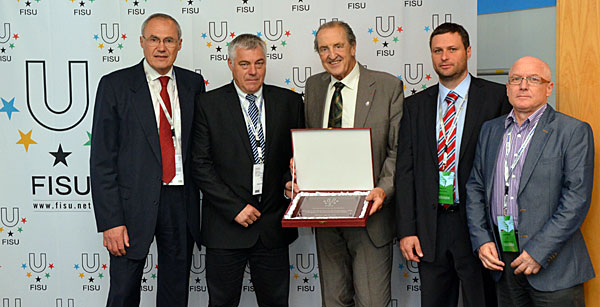 The delegates from Slovakia with the FISU President (middle)
The delegates from Slovakia with the FISU President (middle)
The CSU WU gave its progress report which was followed by the progress report of the two OCs of the 2015 Winter Universiade. Indeed, as reported previously, former WU host Strbske Pleso (SVK) stepped in to host the Nordic Skiing and Biathlon. For this OC it was the first opportunity to present its progress report to the FISU board. Dusan Hamar gave an update of the readiness of the host city. Staff has been assigned at key positions and the venues are ready. Strbske Pleso will host the cross country skiing events, the ski jumping and the Nordic combined competitions while the Biathlon will be staged in the National Biathlon Centre in Osrblie. Dr. Hamar also gave an overview of the selected Hotels and gave some details regarding transportation and logistics. Official entry point will be the airport in Kosice, with Airport Vienna (Schwechart) as an optional point of entry. Two accreditation centres will be set up for the athletes, i.e. one in Hotel Sorea in Strbske Pleso and one in Hotel Partizan in Osrblie. Dr. Hamar also informed about the visa procedures for the participants.
2015 Summer Universiade
 The Gwangju OC delegates
The Gwangju OC delegates
The OC has finished an organizational expansion and office relocation. Now, the total number of staff is 370 including 51 professionals in the broadcasting, uniform, marketing, sports, and language departments. The OC has changed from 3 divisions and 10 departments to 7 divisions and 20 departments. The OC established an organizational support network for a successful Universiade and is collaborating with the local sports associations, KADA, Korea Meteorological Administration, Gwangju Design Center, and 9 local culture organizations. From 12 to 31 August, 6 test competitions will be conducted, i.e. judo, volleyball, football, table tennis, baseball and handball. The second CTI inspection will be held from 28 May and venues & operation inspections with 30 sports Technical Delegates and FISU secretariat staff are schedules, focusing on venue layout plan, competition schedule, time and scoring system operation, and ITO accommodation. A TIMS Test Lab similar to the actual games time operation has been built and operated, through which the OC will examine and improve TIMS performance. A GMS will be developed in the near future. A dedicated NUSF Service Team was also created which consists of 5 members. The Security Unit has been created in January and the OC is in the process of establishing a master plan. The OC also created the opening and closing ceremony department and a design agency has been selected.
2017 Summer Universiade
 The delegation from Taipei 2017 leaded by M. Ting the Vice-Mayor of Taipei City (third from the right)
The delegation from Taipei 2017 leaded by M. Ting the Vice-Mayor of Taipei City (third from the right)
The Taipei City OC presented its progress report. In their presentation, the OC delegates gave an overview of the progress made since their last report giving an overview of the changes per department of their organisation. The OC also revised its Master plan and the updated version is scheduled for August as well as the Marketing Plan. The OC currently is following up on the advice given by the FISU Technical Delegates after the recently held first CTI inspection. An update on visa policy for the participants was given as well. The OC delegates also presented a preliminary design report of the newly built Athletes’ Village.
2017 Winter Universiade
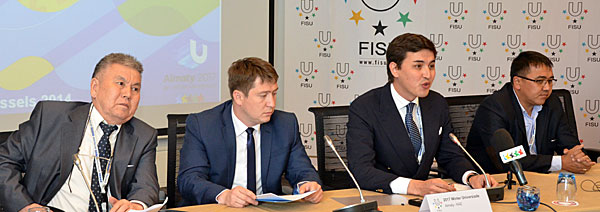 The Almaty 2017 Winter Universiade OC
The Almaty 2017 Winter Universiade OC
The day ended with the presentation of the progress report from the Almaty OC. Two new ice arenas are being built. The Ice Arena will have a capacity of 3,000 spectators and will host the men’s ice hockey tournament while the Ice Palace with a capacity of 12,000 spectators is also under construction and will host the figure skating competitions as well as the Opening and Closing Ceremonies of the Universiade. The technical and economic study for a Universiade Village project for 5,000 places is under development. The Torch Relay route for the 2017 Winter Universiade has been approved. The total duration of the Relay will be 45 days. In the meanwhile a promotional campaign ‘The Lessons of the 2017 Winter Universiade’ is running throughout schools, colleges and universities in Kazakhstan’s main cities Astana and Almaty.
C. Pierre, Press Officer
